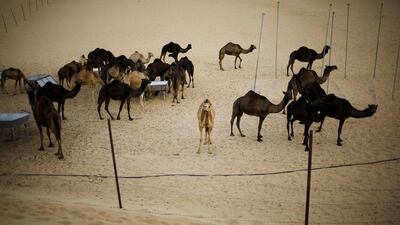Mention the Middle East Respiratory Syndrome coronavirus and the conversation stiffens.
“They’re liars,” said one Dubai camel owner. “This is what outsiders say.” He changed the subject quickly to an upcoming trip to Thailand.
“It’s all talk,” said a race administrator in Abu Dhabi. “Who said it comes from the camels?”
Many things are discussed at camel farms but Mers coronavirus is not one of them. The virus, identified last May, has killed more than 100 people and the UAE has the second-highest reported infection rate after Saudi Arabia.
Borders, however, are viewed as marginally important to many camel owners and they have no plans to stop participating in regional races or mating events when international races and breeding season restarst in September.
The virus is "extraordinarily common" in camels according to Ian Lipkin, of Columbia University. More research is needed to convince owners who simply do not believe the growing evidence that camels are a likely source of human infection.
Serious discussion of Mers between owners only began last week after Saudi Arabia’s Health Ministry confirmed a link between camels and the virus.
“It’s not from camels,” a friend said. “This is a common theme running through all conversations with people. They don’t believe what was mentioned. Camels are good for people’s health. The urine it helps [treat] cancer.”
To understand this disbelief, remember that the camel is not just kept for racing. Many swear by the curative powers of its milk and urine, used medicinally for generations. It is unthinkable for owners that the animal of desert salvation could pose a health risk.
“It’s not like a hobby that I have temporarily and when it’s not good I’m going to leave it,” my friend said. “We’re trying to protect our camels and if there are any diseases we give them the right medicine.
“You know, we live with these camels. There’s no disease that has come from that. We don’t believe that it’s a carrier.”
Owners seem unaware that camels are usually unaffected by the virus and generally show no symptoms. They often have limited contact with their herd but in some families everyone from toddlers to great-grandfathers visit farms on a daily basis and drink fresh milk. Knowledge of the coronavirus has not changed this. People dismiss Mers as a “false alarm”, “temporary propaganda” or a ploy by pharmaceutical companies.
Of the cases so far, eight per cent of cases can be directly linked to contact with camels while the rest are human-to-human transmissions, almost always in a health care setting like a hospital or clinic.
This week the UAE's Ministry of Environment and Water announced that it would tighten quarantine rules and the movement of animals.
The Health Authority-Abu Dhabi has launched English and Arabic websites that explain how to minimise risk and the Ministry of Health has launched an online 'smart clinic' where a public health specialist on Twitter answers questions in English and Arabic.
Yet handlers at farms are often from Bangladesh or Pakistan. They speak limited Arabic and no English and are usually illiterate in both. Even Arabic-speakers who live beside racing camels, such as Sudanese camel traders and Omani families selling tack, reside outside urban centres and have limited access to media and information.
Herders of majahim, the milk camels used in beauty contests, typically live in remote areas of Al Gharbia with herds that graze in Saudi Arabia.
Given the skepticism surrounding the virus’ transmission, it is unlikely that they are informed of the risks by camel owners. Government-run outreach programmes could help address this.

